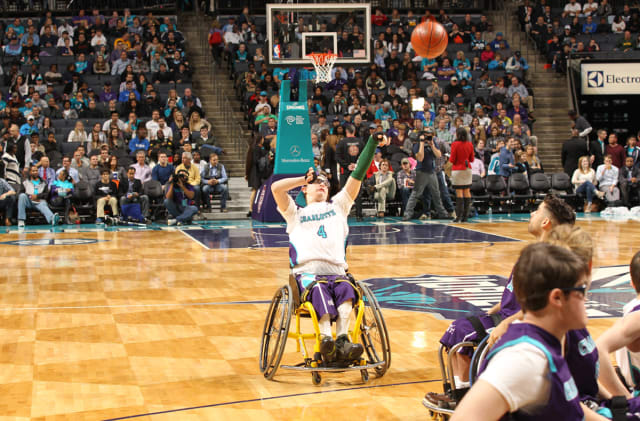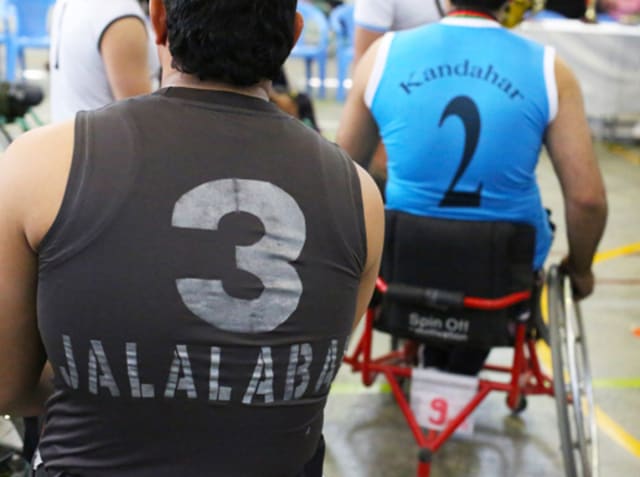Why wheelchair basketball matters - Revisited
CHARLOTTE (Steve Goldberg's Wheel World) - As the new season begins in earnest, I thought this would be an appropriate time to revisit why wheelchair basketball matters
CHARLOTTE (Steve Goldberg's Wheel World) - I've seen this more than once. The whistle blows for halftime at an NBA game and just as the high flyers head to the locker room, two other teams roll onto the court, literally.
If you recognize these words, then you were among the first to read this column when it launched in March 2012. A lot has happened since then and with this platform I've been fortunate to share much of that with you.
As the new season begins in earnest, I thought this would be an appropriate time to revisit why wheelchair basketball matters because as much as I knew then, I've learned so much more.
In that first column, I related the transformation that occurs when people see wheelchair basketball for the first time, the evolution from polite and possibly patronizing applause to honest appreciation of the skill involved.

The crowd gives polite applause as the players roll onto the court. After the first NBA distance three-pointer goes in though, that becomes a roar. Photo by Steve Goldberg/SCS Media
I wrote at that time that wheelchair basketball, and by association all adaptive sport, mattered because at the very minimum, it demonstrated that it's what you can do that's important, not what you can't.
"It matters," former NBA pro Matt Carroll, told me then, "because it shows you that regardless of your situation or your circumstance that you can still play the game of basketball."
About that halftime game; the first thing that those fans saw was the wheelchairs. It was also the first thing they forgot as it became just basketball. That's the way it should be. That's why it matters.
Wheelchair basketball matters because it was the first organized team sport developed for those with a disability, as a rehab activity for soldiers returning from World War II around 1946. The human proclivity towards competition moved it quickly from recreation to game on.
FYI, 1946 was the same year that the Basketball Association of America (BAA), the predecessor to the NBA, was formed.
And just a few years after the NBA was christened, so was the National Wheelchair Basketball Association (NWBA).
There are now tens of thousands of players around the world and tens of millions more people around the world watched last September's Paralympic tournament from Rio de Janeiro.
Medals were won and crowds filled the arenas but I've learned that some of the most compelling reasons as to why wheelchair basketball matters are far more private and personal moments.
Such as my being able to share the account of a mother whose son learned through the game a lesson that he might never have received otherwise.
"Wheelchair basketball seriously changed my son's life." - Zimra Vigoda
She wrote how, frustrated by several losses in his first tournament, the then 10-year-old boy refused to shake hands with the opposing team until his coach called him out. She thought it was a make-orbreak moment that could go either way.
Perhaps the most important message in her story, though not stated, was that the wheelchair aspect was incidental. It was the power of sport, her son's desire to stay part of a team and a coach's understanding and measured discipline that forged a pivotal change in his behavior, and his life.
At the same period, the NBA was omitting the NBA/NWBA All Star Wheelchair Classic from the league's All-Star weekend for the first time since it began in 1998. It gave me the chance to shine a light on some real stars of the game, the coaches, administrators and parents who make it possible for kids to play basketball. That's why it matters.
While the big lights shine on events such as the Rio 2016 Paralympic Games and the International Wheelchair Basketball Federation's (IWBF) World Championships, wheelchair basketball matters far more because of people like Madhavi Latha who founded the Wheelchair Basketball Federation of India in 2014, opening the door for her countrymen and women to build confidence and demonstrate their abilities through the game.
 Teams from eight provinces competed in the Fall 2016 Afghanistan Men's National Wheelchair Basketball Tournament, double that which began in 2012. Photo courtesy of ICRC/Thomas Glass
Teams from eight provinces competed in the Fall 2016 Afghanistan Men's National Wheelchair Basketball Tournament, double that which began in 2012. Photo courtesy of ICRC/Thomas Glass
I was in Rio and London to tell you about the teams and players there and will continue to report on the highest levels of the game but wheelchair basketball matters because of the smaller stories I can share on the impact it can have on one life or many.
For me that's something far bigger than medals and trophies.
Steve Goldberg
FIBA
FIBA's columnists write on a wide range of topics relating to basketball that are of interest to them. The opinions they express are their own and in no way reflect those of FIBA.
FIBA takes no responsibility and gives no guarantees, warranties or representations, implied or otherwise, for the content or accuracy of the content and opinion expressed in the above article.
To help make this column as inclusive as possible, please send any national or international event information, story suggestions, or comments to wheelworldmail@gmail.com.